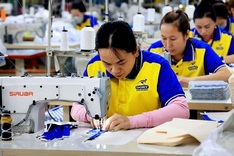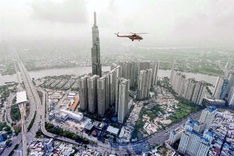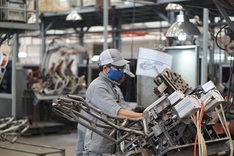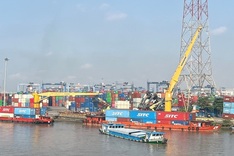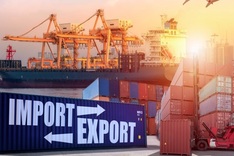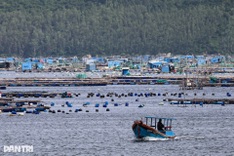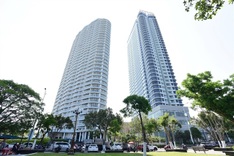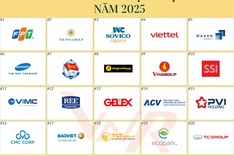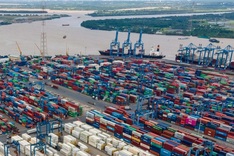 Double-digit inflation that has been blunting Vietnam's low-cost competitive edge and scaring away investors is showing signs of receding.
Double-digit inflation that has been blunting Vietnam's low-cost competitive edge and scaring away investors is showing signs of receding.
At 6.9 per cent last year, the rise in general prices in Vietnam was still high by most Asian standards - but it was down from 23 per cent in 2008. And last year's inflation was Vietnam's lowest in six years.
The government projects the average price increase this year to stay about the same as last year, at 7 per cent. So it looks like the inflation tiger is being tamed - which is good news for investors, given Vietnam's huge potential.
Singapore investors should see this as a signal to step up their presence in Vietnam, building on the investments that they have already made there, says International Enterprise (IE) Singapore, the trade promotion agency that is also pushing Singapore companies to expand abroad.
Lower inflation in Vietnam is expected to be matched by higher economic growth.
'As one of the few countries that kept growing during the global downturn, Vietnam is expected by many market watchers to perform even better in 2010, especially with the gradual recovery of the world economy,' says Chiong Woan Shin, IE Singapore's regional director for Vietnam and Cambodia.
'As the global economy starts to recover, Vietnam is poised to present numerous business and investment opportunities for Singapore companies.'
The official economic growth forecast for Vietnam for this year is 6.5 per cent. 'On the ground, business sentiment about Vietnam is improving,' says Ms Chiong, citing the upbeat results of a November 2009 poll of 200 investors in Vietnam by consulting firm Grant Thornton.
Fifty-nine per cent of those polled were 'positive' on Vietnam's economic performance, up sharply from 36 per cent in a poll in April last year. Two out of three respondents said that Vietnam was more attractive than other investment destinations, with 63 per cent ready to pump money into the country.
Investors are returning to Vietnam after foreign direct investment there plunged 70 per cent last year - thanks to the Great Recession - to US$21.5 billion, from US$71.7 billion in 2008.
Foreign investment is tipped to bounce back 10 per cent to between US$22 billion and US$25 billion this year.
Ms Chiong says that Singapore had US$17.3 billion tied up in 792 projects in Vietnam at end-2009, making it the country's fifth-biggest foreign investor.
Singapore companies are building and running industrial parks in Vietnam. They are involved in the logistics business and they have set up retail operations and schools there.
Among Singapore companies that have a presence in Vietnam are CapitaLand, Keppel Corporation, Ascendas, Mapletree Investments, YCH Group, Charles & Keith and The Little Skool-House.
Vietnam offers Singapore businesses not just cheaper labour but a sizable market with a growing middle class - and the country is not far from Singapore.
'Vietnam's geographic proximity to Singapore and availability of labour makes it an attractive business and investment destination,' says Ms Chiong. 'In particular, Vietnam is a viable offshore manufacturing site. The Vietnamese government welcomes and encourages multinational companies to invest and base their manufacturing activities there.'
MNCs such as Intel from the US, Canon from Japan and Samsung from South Korea are already operating in a big way in Vietnam.
Ms Chiong says that Singapore companies wanting to set up shop there for the first time may want to do so in one of the many industrial parks built by Singapore developers.
'Industrial parks by Singapore companies such as Ascendas, Mapletree Investments and Sembcorp can provide integrated and dedicated infrastructure for Singapore investors and businesses and offer ready space for efficient, hassle-free start-ups,' she says.
Despite Vietnam's potential, Singapore companies venturing into the market must also be aware of the challenges. In terms of ease of doing business, Vietnam does not rank high on the World Bank's list.
In the 2010 rankings, it is placed 93rd out of 183 countries. Notably, Vietnam ranks behind Singapore (No. 1), Thailand (No. 12) and China (No. 89).
Singapore companies in Vietnam also complained that they have problems with the country's language, culture, business practices and regulations. But IE Singapore, which has offices in Hanoi and Ho Chi Minh City, is ready to help, including hooking up Singapore companies with potential local partners.
Time to do business in Vietnam
With inflation under control, cheap labour and sizable market, Vietnam presents investment opportunities.
Source: Business Times



